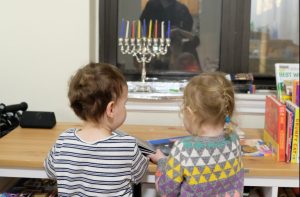Community Blog Hanukkah and Thanksgiving: An Opportunity for Hybridity

Everyone is talking and writing about the rare overlap between Hanukkah and Thanksgiving this year. Thanksgivukkah has become a virtual industry with bloggers, websites and commercial products focusing attention on this unusual calendric phenomenon. Beyond all the hype, is there something of substance that can be derived from the intersection of these two different holidays?
I would like to suggest that we are in a moment of American Jewish history that calls for an emphasis on hybridity. In my opinion, the recent Pew study points to the need for 21st-century Judaism to intensify its dialogue with American society. Most American Jews are not living in two civilizations as thinkers like Kaplan in the early part of the 20th century imagined. American culture is clearly dominant for American Jews, and the question is how can Judaism, using its separate symbol system and set of values, interact with American culture to enrich and deepen the life of Jews living fully immersed in American civilization.
I now drive a hybrid car that operates with two engines, one gas and one electric. It has a plug-in capacity that allows it to run purely on electricity for up to 21 miles. For my short, local commute I can drive using just the electric engine; and for longer trips the gas engine kicks in. In addition to using a combination of electricity and gas, it can also run using just the gas engine if I want to save the electric power for later. The metaphor of these two engines working in tandem as well as separately may be instructive for how we think of the hybridity of American Judaism.
The confluence of Hanukkah and Thanksgiving provides a unique opportunity to experiment with a more intentional exchange between American and Jewish cultural symbols. What can each teach and offer to the other? Thanksgiving has important lessons for Jewish life in America. Thanksgiving is a low-barrier holiday that invites Americans to celebrate the universal need to express gratitude without a heavy load of rituals or great complexity. It features the home and family as a primary locus of gratitude for our shared national blessings; and its focus on one celebratory meal makes for a simple, enticing and joyful experience. Thanksgiving provides an open setting for family conversation and connection that can deepen our most precious relationships and create a shared experience for a broad spectrum of our diverse society.
Jewish life, and Hanukkah in particular, can learn from these elements of Thanksgiving. Hanukkah can also offer a compelling model to America of how to give thanks for our national and religious freedom. Unlike Thanksgiving, Hanukkah has a central text. Ritualized texts can provide depth and texture to a holiday celebration. Hanukkah draws upon several texts, including the Book of Maccabees and the Al-Hanissim prayer.
But it is the Hallel, the series of psalms that we recite on holidays as an expression of joy and gratitude, that is most central to Hanukkah. Maimonides in his legal code, the Mishne Torah, places the laws of Hallel in the section that deals with Hanukkah. Hanukah is essentially a holiday of thanksgiving. The Hallel psalms, sung with joyous melodies, root the celebration in ancient poetry that connects us to past generations and leverages power of human language to express our deepest sentiments.
This year we have the opportunity to experiment with American Jewish hybridity. Can singing Hallel at the table enrich our Thanksgiving meal? Can our Hanukkah celebration be enlarged by the special Thanksgiving dinner that connects us to our American tradition? Hanukkah and Thanksgiving will remain independent from one another for another 79,000 years, but this year we can create a hybrid that enables these two great holidays to engage with each other, and in so doing, bring our American and Jewish selves into a more intentional dialogue.
Happy Hanukkah and Thanksgiving.


